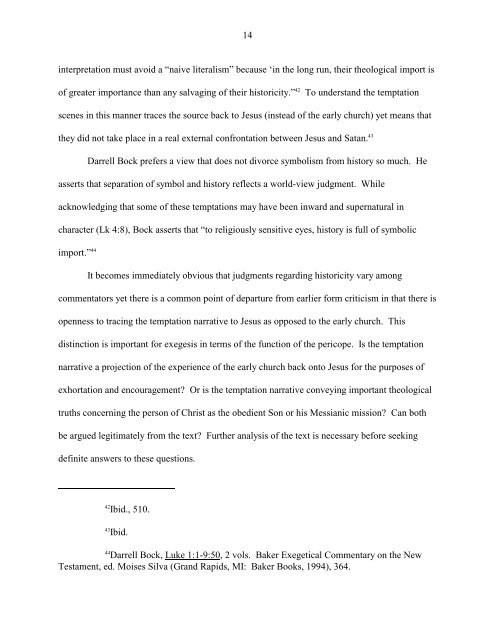southwestern baptist theological seminary school of theology ... - Lorin
southwestern baptist theological seminary school of theology ... - Lorin
southwestern baptist theological seminary school of theology ... - Lorin
You also want an ePaper? Increase the reach of your titles
YUMPU automatically turns print PDFs into web optimized ePapers that Google loves.
14<br />
interpretation must avoid a “naive literalism” because ‘in the long run, their <strong>theological</strong> import is<br />
<strong>of</strong> greater importance than any salvaging <strong>of</strong> their historicity.” 42 To understand the temptation<br />
scenes in this manner traces the source back to Jesus (instead <strong>of</strong> the early church) yet means that<br />
they did not take place in a real external confrontation between Jesus and Satan. 43<br />
Darrell Bock prefers a view that does not divorce symbolism from history so much. He<br />
asserts that separation <strong>of</strong> symbol and history reflects a world-view judgment. While<br />
acknowledging that some <strong>of</strong> these temptations may have been inward and supernatural in<br />
character (Lk 4:8), Bock asserts that “to religiously sensitive eyes, history is full <strong>of</strong> symbolic<br />
import.” 44<br />
It becomes immediately obvious that judgments regarding historicity vary among<br />
commentators yet there is a common point <strong>of</strong> departure from earlier form criticism in that there is<br />
openness to tracing the temptation narrative to Jesus as opposed to the early church. This<br />
distinction is important for exegesis in terms <strong>of</strong> the function <strong>of</strong> the pericope. Is the temptation<br />
narrative a projection <strong>of</strong> the experience <strong>of</strong> the early church back onto Jesus for the purposes <strong>of</strong><br />
exhortation and encouragement? Or is the temptation narrative conveying important <strong>theological</strong><br />
truths concerning the person <strong>of</strong> Christ as the obedient Son or his Messianic mission? Can both<br />
be argued legitimately from the text? Further analysis <strong>of</strong> the text is necessary before seeking<br />
definite answers to these questions.<br />
42 Ibid., 510.<br />
43 Ibid.<br />
44 Darrell Bock, Luke 1:1-9:50, 2 vols. Baker Exegetical Commentary on the New<br />
Testament, ed. Moises Silva (Grand Rapids, MI: Baker Books, 1994), 364.

















